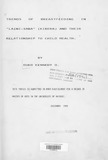| dc.description.abstract | This study was carried out in "Laini-Saba" village of the
Kibera slum area in Nairobi. It examined the prevalence of
breast feeding among mothers resident in such an urban slum
setting, and also attempted to understand the relationship
between such factors as employment or educational level of a
mother and her ability to breastfeed successfully. In the same
vein, the study looked into the various reasons which slum dwelling
mothers may have for discontinuing breastfeeding and
introducing other foods into their babies' diets. Having
achieved the foregoing, the study attempted to establish how
residence in a slum community affects the health of slum children
vis-a-vis the nature of the diseases that usually ail them and
how relevant breastfeeding is to the overall health of such
children.
The study population consisted of mothers residing in
"Laini-Saba" village of Kibera who had children below two years
of age during the research period. They were randomly selected
using the door-to-door enumeration process based on the principle
of "snow-balling" and the system of statistical random numbers.
Such selection was also guided by the mothers' willingness to
participate in the interview process whose main tool was the
questionnaire. The mothers were the study's respondents while the
children and the residential units (houses) were the units of
analysis. One hundred respondents were interviewed, fifty-eight
of whom were breastfeeding during the research period and forty two
of whom had breast fed sometime hitherto but had now ceased
doing so.
Various hypotheses were tested during data analysis and this
led to certain salient findings. The study confirmed that a
mother's ability to carry her breastfeeding child to her workplace,
and hence to be able to breast feed without any hitches
even after resumption of work depends, to a large extent, on the
nature of her occupation. Those engaged in self-employment (such
as hawking or market. trading) may for example, be in a better
position to carry their children to work than their counterparts
who are employed in the formal sector.
The study also established that the decision to breast feed a
child depends partly on the mother's level of education since the
level of education she attains may be the crucial determinant of
what kind of employment she engages in, or her level of awareness
of the basic requirements of successful child care such as
breastfeeding.
Regarding the health of the children, the study revealed
that the health status of the slum-dwelling children is not
determined by the period during which such children were
exclusively breast fed. Similarly.! it was confirmed that the
nature of the disease these children usually suffer from is not
determined by whether they were breast fed or not.
Following such findings as the foregoing, it has been
concluded that for the slum-dwelling mothers, breast feeding may
not be feasible, considering their occupational categories and
that the extent to which such mothers practise breastfeeding is
not really very important in improving the health of their
children, considering the squalid conditions in which such
children are born. It was further concluded that level of
education plays a relatively insignificant role in the promotion
of awareness of breast feeding requirements as contrasted to word
of mouth from neighbours, friends and midwives. For that reason,
the failure of slum-dwelling mothers to breast feed consistently
for lengthy periods of time was found to lie more with other factors
such as nature of employment or various problems including breast
infections and the child's rejection of breast milk.
In a slum village such as "Laini-Saba", therefore,it became
apparent from the study that hardly any significant relationship
seemed to exist between breast-feeding and child health. Rather,
the state of the slum child's health is determined more by the
environment in which he grows up and his mother's ability to
provide good care even as she pursues economic-oriented goals
which are supposed to improve this ability.
The study's recommendations mainly revolve around the need
for action by the government towards improving living conditions
in slum areas such as "Laini-Saba" in Kibera. These include
improving the water supply, garbage collection services and health
services. Only then can the chances of improving the child's
overall health status and of undertaking breast-feeding successfully
be enhanced in such communities. | en |

